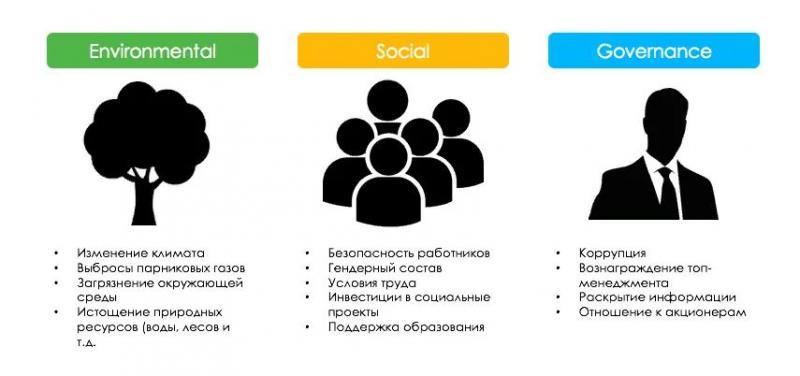
ESG: what is it and why do Russian companies need it?
One of the world's principles of responsible investment is to check the company for compliance with the principles of ESG (English: environmental-ecology, social-social development, governance-corporate governance).
This index tells investors about the company's strategy, the working conditions of employees and how the company cares about the environment.
According to the British audit and consulting company EY, 97% of investors today are guided by the ESG index, making decisions where to invest money. Thus, in terms of its popularity, ESG can compare with the assessment of the credit rating, one of the key indicators for investors.
There are many well-known brands among the companies with a high ESG rating today. For example, fashion houses Gucci, Michael Kors, Jimmy Choo and Armani received it for abandoning the use of natural fur and switching to synthetic materials. And shoe manufacturer Nike-for reducing the use of genuine leather and switching to recycled Fly Leather.
But the gaming business, tobacco or alcohol producers, companies that use child labor, as well as old production facilities that are not modernized, cannot apply for the ESG index a priori.
Requirements for companies are tightened every year, said Ekaterina Demicheva, Development Director of Rusatom Greenway, at the conference "Industrial Ecology: a Course for Safety", organized by the Vedomosti newspaper.
"ESG approaches were formulated by the UN more than 15 years ago. Today, they are enshrined in the document "Principles of Responsible Investment". This list is expanded every year. Today it consists of 17 positions. And nine of them concern the environment, " Demicheva said.
For example, in order to count on investment, an enterprise must control greenhouse gas emissions, recycle waste, restore forest if it uses it in its production, do not deplete natural resources, including water, and so on.

ESG: what is it and why do Russian companies need it? Against
the background of the COVID-19 pandemic, investors ' interest in ESG indices is growing, experts say. By the end of the year, the global market for responsible investment may double, economists predict.
"The trend towards the introduction of sustainable development is particularly clear now, when even during the crisis, there is a stable growth of portfolios with ESG factors," Roman Panov, First Vice President of Gazprombank, said at a conference in Vedomosti. "The demand for ESG financing tools around the world is very high and will only continue to increase in the near future."
But despite the fact that ESG factors have become one of the key indicators for investors, there is no single methodology for assigning a rating to companies based on them. The ESG principles are based on the goodwill of companies, transparency and responsibility.
Domestic ESG
For the Russian business community, at least for companies operating in the domestic market, ESG is an exceptionally new direction, which may take more than one year to fully develop.
For the second year in a row, the RAEX agency has compiled its ESG rating of Russian companies. In 2019, Lukoil, Tatneft, Gazprom, Norilsk Nickel, and Rosseti entered the TOP 5. The RAEX rating does not take into account companies from the financial sector, telecom and retail: they already have a minimal impact on nature, according to the agency's website.
In section E (environmental), the following indicators are used: the volume of water resources used, the volume of waste produced, the volume of total emissions into the atmosphere.

ESG: What is it and why do Russian companies need it?
The government understands that it is difficult for most Russian companies to compete with international corporations that have been implementing green technologies for more than a decade.
That is why the authorities are thinking about alternative tools to support eco-oriented enterprises. And then it turned out: such projects already exist in Russia. For example, BAT – "Best available technologies".
Such technologies have been used for almost 10 years to produce products, perform works and provide services based on modern achievements of science and technology, as well as in compliance with environmental protection requirements.
As part of the national project "Ecology", by 2024, all industrial facilities in Russia that have a significant impact on the environment should switch to the best available technologies (BAT).
Until then, the requirements for their work will be written in special BAT reference books. In total, there will be 51 of them-according to the number of industries participating in the BAT program, said Vasily Osmakov, Deputy Minister of Industry and Trade of Russia, at the conference in Vedomosti.
The Declaration in the framework of the BAT will be voluntary. However, those who can prove that they work exactly according to the "best available technologies" will be able to count on state support.

ESG: What is it and why do Russian companies need it?
Another tool to encourage the transition to eco-friendly production in Russia was launched in 2018. At the initiative of Vladimir Putin, the country began to issue so-called "green bonds".
At the same time, on the Moscow Stock Exchange, the company from Ugra was the first in the country to place "green" securities for 1.1 billion rubles, planning to direct the proceeds to the construction of a landfill in the KhMAO.
"In two years, there were only three issues of such bonds," said Vasily Osmakov. – Therefore, it is still difficult to call such bonds a financial institution. They are more likely to be in the nature of marketing or branding. But in general, the government's attitude in this direction is positive."
According to the Deputy minister, the main problem of "green" financing today is the lack of clear parameters. The Central Bank was asked to think about them.
The Ministry of Industry and Trade is also waiting for the government to issue a resolution on concessional lending to enterprises – it should be ready by the end of the year.
Without an environmental agenda, it is difficult for modern enterprises to claim large investments and compete in the global market, experts conclude. This means that the trend for environmental friendliness will continue to be in demand. The next task is to learn how to extract financial benefits from this, as, for example, the world leaders of the ESG rating are already doing.
Author: natsproektekologiya. rf










